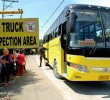The ordinance said that organic agriculture zones “will be protected from encroachment and contamination by chemical-based farm inputs and genetically-engineered crops”.
The zoning also protects indigenous farming practices related to organic farming by mandating “the continuous use of these practices, ensuring its sustainability through farming generations”.
The Implementing Rules and Regulations (IRR) of the ordinance defines these zones to have the following minimum criteria: “a. presence of actual organic agriculture practitioners; b. presence of natural or man-made water formations, including areas covered for irrigation and similar facilities; c. identified buffer zone to shield organic agriculture from other land uses that impact on the integrity of the practice of organic agriculture; and, d. areas suited for agricultural production as defined in the Davao City Land Use Plan.”
Joy Enriquez of Go Organic Davao City (GoDC) said organic farms can mitigate the impact of climate change and increase the fertility of the soil.
“Establishing organic farming zones all around the city will ensure Davao’s food security and make the city climate resilient.”, Enriquez said.










